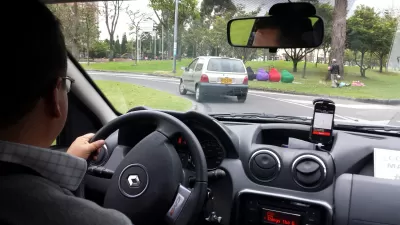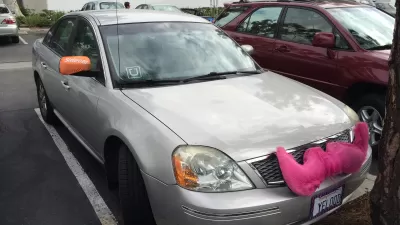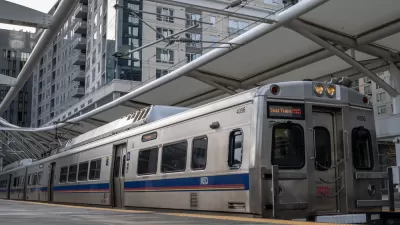The train ride from Summit, New Jersey to Penn Station takes 45 minutes. The real problem: getting to the train. By subsidizing Uber rides to and from the local station, the town hopes to avoid building another expensive parking lot.

Solving the first mile-last mile problem has long occupied a top spot on transit planners' to-do lists. How can we increase transit use by making it easier for people to get from their homes to the nearest station?
The question may have less to do with boosting transit and more to do with making commuters' lives easier.
In the town of Summit, New Jersey, commuters who take the train to New York City can't find anywhere to park their cars for the day. From Priya Anand's piece: "Commuters buy parking permits, but are not assigned spaces, and often waste 15 to 20 minutes prowling for a spot in the morning [...] But building a new parking lot to address commuter demand would be a long-term, multimillion-dollar endeavor."
One answer: subsidize Uber rides to and from the station. "Priced at $2 each way, the rides would cost commuters the same as an all-day parking permit. The deal would reduce demand for Summit's hard-to-come-by parking spaces and create a steady pool of demand for Uber."
Clearly interested in extending its service to car-dependent suburbanites, Uber has agreed to a six-month pilot program serving 100 residents. Summit's city administrator estimates that the program would only cost about $167,000 per year, a tiny fraction of what it would take to install parking.
To be fair, "Summit is about 6 square miles, which keeps ride-hail fares within its boundaries relatively inexpensive." And far more than 100 residents may eventually want to use the program. But Uber has plenty of reasons to make this kind of initiative work: not only does rideshare fully enter the suburbs; daily commuters also offer steady business, unlike weekend partygoers, occasional visitors, and other Uber staple clients.
FULL STORY: How Uber Plans To Conquer The Suburbs

Alabama: Trump Terminates Settlements for Black Communities Harmed By Raw Sewage
Trump deemed the landmark civil rights agreement “illegal DEI and environmental justice policy.”

Study: Maui’s Plan to Convert Vacation Rentals to Long-Term Housing Could Cause Nearly $1 Billion Economic Loss
The plan would reduce visitor accommodation by 25% resulting in 1,900 jobs lost.

Planetizen Federal Action Tracker
A weekly monitor of how Trump’s orders and actions are impacting planners and planning in America.

Parklet Symposium Highlights the Success of Shared Spaces
Parklets got a boost during the Covid-19 pandemic, when the concept was translated to outdoor dining programs that offered restaurants a lifeline during the shutdown.

Federal Homelessness Agency Places Entire Staff on Leave
The U.S. Interagency Council on Homelessness is the only federal agency dedicated to preventing and ending homelessness.

Restoring Northern India’s Himalayan ‘Water Temples’
Thousands of centuries-old buildings protect the region’s natural springs and serve as community wells and gathering places.
Urban Design for Planners 1: Software Tools
This six-course series explores essential urban design concepts using open source software and equips planners with the tools they need to participate fully in the urban design process.
Planning for Universal Design
Learn the tools for implementing Universal Design in planning regulations.
Caltrans
Smith Gee Studio
Institute for Housing and Urban Development Studies (IHS)
City of Grandview
Harvard GSD Executive Education
Toledo-Lucas County Plan Commissions
Salt Lake City
NYU Wagner Graduate School of Public Service





























